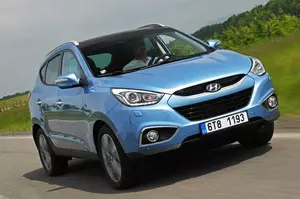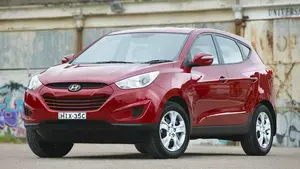
| Engine | 0—60 mph | 0—100 km/h | Top Speed | Averange Economy |
|---|---|---|---|---|
| Fuel Cell | 11.9 s | 12.5 s | 99 mph | - |
| Engine | Fuel Cell |
|---|---|
| 0—60 mph | 11.9 s |
| 0—100 km/h | 12.5 s |
| Top Speed | 99 mph |
| Averange Economy | - |
In 2013 Hyundai ix35 0-60 acceleration was 11.9 seconds.
Hyundai ix35 0-60 mph was up to 25% slower in 2013 than world's average.
In 2013, Hyundai ix35 0-60 mph to car weight ratio is shown below:
| Vehicle | Acceleration 0—60 mph (0—100 km/h) | Maximum speed | Acceleration to passenger ratio | Fuel consumption at high speed | Fuel type / gearbox |
|---|---|---|---|---|---|
| Fuel Cell | 11.9 s to 60 mph (12.5 s to 100 km/h) | 99 mph (160 km/h) | 2.4 s to 60 mph / person | - | Hydrogen / 1 |
| Vehicle | Fuel Cell |
|---|---|
| Acceleration 0-60 mph (0-100 km/h) | 11.9 s to 60 mph (12.5 s to 100 km/h) |
| Maximum speed | 99 mph (160 km/h) |
| Acceleration to passenger ratio | 2.4 s to 60 mph / person |
| Fuel consumption at high speed | - |
| Fuel type / gearbox | Hydrogen / 1 |

| Engine | 0—60 mph | 0—100 km/h | Top Speed | Averange Economy |
|---|---|---|---|---|
| 1.6 GDI | 10.5 s | 11.1 s | 111 mph | 37 mpg |
| 2.0 GDI | 10.5 s | 11 s | 112 mph | 29 mpg |
| 2.0 CRDi | 9.3 s | 9.8 s | 121 mph | 33 mpg |
| 1.7 CRDi | 11.8 s | 12.4 s | 107 mph | 45 mpg |
| Engine | 1.6 GDI |
|---|---|
| 0—60 mph | 10.5 s |
| 0—100 km/h | 11.1 s |
| Top Speed | 111 mph |
| Averange Economy | 37 mpg |
| Engine | 2.0 GDI |
| 0—60 mph | 10.5 s |
| 0—100 km/h | 11 s |
| Top Speed | 112 mph |
| Averange Economy | 29 mpg |
| Engine | 2.0 CRDi |
| 0—60 mph | 9.3 s |
| 0—100 km/h | 9.8 s |
| Top Speed | 121 mph |
| Averange Economy | 33 mpg |
| Engine | 1.7 CRDi |
| 0—60 mph | 11.8 s |
| 0—100 km/h | 12.4 s |
| Top Speed | 107 mph |
| Averange Economy | 45 mpg |
In 2013, Hyundai ix35 0-60 acceleration was between 9.3 and 11.8 seconds.
Hyundai ix35 0-60 mph was up to 24% slower in 2013 than world's average.
In 2013, Hyundai ix35 0-60 mph to car weight ratio is shown below:
| Vehicle | Acceleration 0—60 mph (0—100 km/h) | Maximum speed | Acceleration to passenger ratio | Fuel consumption at high speed | Fuel type / gearbox |
|---|---|---|---|---|---|
| 1.6 GDI | 10.5 s to 60 mph (11.1 s to 100 km/h) | 111 mph (178 km/h) | 2.1 s to 60 mph / person | 41 mpg (5.8 L per 100 km) | Petrol (Gasoline) |
| 2.0 GDI | 10.5 s to 60 mph (11 s to 100 km/h) | 112 mph (180 km/h) | 2.1 s to 60 mph / person | 35 mpg (6.8 L per 100 km) | Petrol (Gasoline) / 6 |
| 2.0 CRDi | 9.3 s to 60 mph (9.8 s to 100 km/h) | 121 mph (195 km/h) | 1.9 s to 60 mph / person | 39 mpg (6 L per 100 km) | Diesel / 6 |
| 1.7 CRDi | 11.8 s to 60 mph (12.4 s to 100 km/h) | 107 mph (173 km/h) | 2.4 s to 60 mph / person | 47 mpg (5 L per 100 km) | Diesel |
| Vehicle | 1.6 GDI |
|---|---|
| Acceleration 0-60 mph (0-100 km/h) | 10.5 s to 60 mph (11.1 s to 100 km/h) |
| Maximum speed | 111 mph (178 km/h) |
| Acceleration to passenger ratio | 2.1 s to 60 mph / person |
| Fuel consumption at high speed | 41 mpg (5.8 L per 100 km) |
| Fuel type / gearbox | Petrol (Gasoline) |
| Vehicle | 2.0 GDI |
| Acceleration 0-60 mph (0-100 km/h) | 10.5 s to 60 mph (11 s to 100 km/h) |
| Maximum speed | 112 mph (180 km/h) |
| Acceleration to passenger ratio | 2.1 s to 60 mph / person |
| Fuel consumption at high speed | 35 mpg (6.8 L per 100 km) |
| Fuel type / gearbox | Petrol (Gasoline) / 6 |
| Vehicle | 2.0 CRDi |
| Acceleration 0-60 mph (0-100 km/h) | 9.3 s to 60 mph (9.8 s to 100 km/h) |
| Maximum speed | 121 mph (195 km/h) |
| Acceleration to passenger ratio | 1.9 s to 60 mph / person |
| Fuel consumption at high speed | 39 mpg (6 L per 100 km) |
| Fuel type / gearbox | Diesel / 6 |
| Vehicle | 1.7 CRDi |
| Acceleration 0-60 mph (0-100 km/h) | 11.8 s to 60 mph (12.4 s to 100 km/h) |
| Maximum speed | 107 mph (173 km/h) |
| Acceleration to passenger ratio | 2.4 s to 60 mph / person |
| Fuel consumption at high speed | 47 mpg (5 L per 100 km) |
| Fuel type / gearbox | Diesel |

| Engine | 0—60 mph | 0—100 km/h | Top Speed | Averange Economy |
|---|---|---|---|---|
| 1.6 GDI | 10.5 s | 11.1 s | 111 mph | 37 mpg |
| 2.0 CVVT | 10.2 s | 10.7 s | 113 mph | 31 mpg |
| 2.0 CRDi | 9.7 s | 10.2 s | 121 mph | 33 mpg |
| 1.7 CRDi | 11.8 s | 12.4 s | 107 mph | 45 mpg |
| Engine | 1.6 GDI |
|---|---|
| 0—60 mph | 10.5 s |
| 0—100 km/h | 11.1 s |
| Top Speed | 111 mph |
| Averange Economy | 37 mpg |
| Engine | 2.0 CVVT |
| 0—60 mph | 10.2 s |
| 0—100 km/h | 10.7 s |
| Top Speed | 113 mph |
| Averange Economy | 31 mpg |
| Engine | 2.0 CRDi |
| 0—60 mph | 9.7 s |
| 0—100 km/h | 10.2 s |
| Top Speed | 121 mph |
| Averange Economy | 33 mpg |
| Engine | 1.7 CRDi |
| 0—60 mph | 11.8 s |
| 0—100 km/h | 12.4 s |
| Top Speed | 107 mph |
| Averange Economy | 45 mpg |
In 2010, Hyundai ix35 0-60 acceleration was between 9.7 and 11.8 seconds.
Hyundai ix35 0-60 mph was up to 24% slower in 2010 than world's average.
In 2010, Hyundai ix35 0-60 mph to car weight ratio is shown below:
| Vehicle | Acceleration 0—60 mph (0—100 km/h) | Maximum speed | Acceleration to passenger ratio | Fuel consumption at high speed | Fuel type / gearbox |
|---|---|---|---|---|---|
| 1.6 GDI | 10.5 s to 60 mph (11.1 s to 100 km/h) | 111 mph (178 km/h) | 2.1 s to 60 mph / person | 41 mpg (5.8 L per 100 km) | Petrol (Gasoline) |
| 2.0 CVVT | 10.2 s to 60 mph (10.7 s to 100 km/h) | 113 mph (182 km/h) | 2 s to 60 mph / person | 37 mpg (6.3 L per 100 km) | Petrol (Gasoline) |
| 2.0 CRDi | 9.7 s to 60 mph (10.2 s to 100 km/h) | 121 mph (195 km/h) | 1.9 s to 60 mph / person | 39 mpg (6 L per 100 km) | Diesel / 6 |
| 1.7 CRDi | 11.8 s to 60 mph (12.4 s to 100 km/h) | 107 mph (173 km/h) | 2.4 s to 60 mph / person | 47 mpg (5 L per 100 km) | Diesel |
| Vehicle | 1.6 GDI |
|---|---|
| Acceleration 0-60 mph (0-100 km/h) | 10.5 s to 60 mph (11.1 s to 100 km/h) |
| Maximum speed | 111 mph (178 km/h) |
| Acceleration to passenger ratio | 2.1 s to 60 mph / person |
| Fuel consumption at high speed | 41 mpg (5.8 L per 100 km) |
| Fuel type / gearbox | Petrol (Gasoline) |
| Vehicle | 2.0 CVVT |
| Acceleration 0-60 mph (0-100 km/h) | 10.2 s to 60 mph (10.7 s to 100 km/h) |
| Maximum speed | 113 mph (182 km/h) |
| Acceleration to passenger ratio | 2 s to 60 mph / person |
| Fuel consumption at high speed | 37 mpg (6.3 L per 100 km) |
| Fuel type / gearbox | Petrol (Gasoline) |
| Vehicle | 2.0 CRDi |
| Acceleration 0-60 mph (0-100 km/h) | 9.7 s to 60 mph (10.2 s to 100 km/h) |
| Maximum speed | 121 mph (195 km/h) |
| Acceleration to passenger ratio | 1.9 s to 60 mph / person |
| Fuel consumption at high speed | 39 mpg (6 L per 100 km) |
| Fuel type / gearbox | Diesel / 6 |
| Vehicle | 1.7 CRDi |
| Acceleration 0-60 mph (0-100 km/h) | 11.8 s to 60 mph (12.4 s to 100 km/h) |
| Maximum speed | 107 mph (173 km/h) |
| Acceleration to passenger ratio | 2.4 s to 60 mph / person |
| Fuel consumption at high speed | 47 mpg (5 L per 100 km) |
| Fuel type / gearbox | Diesel |